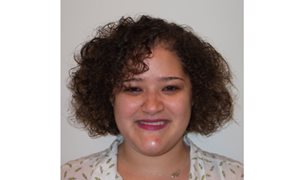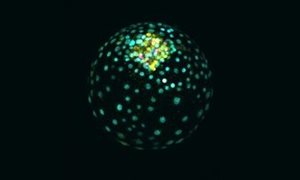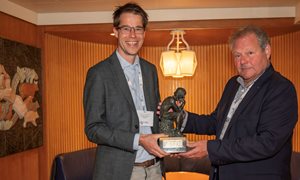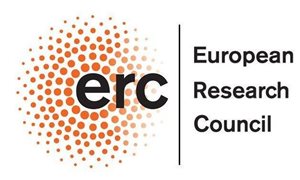 Jessie van Buggenum and Klaas Mulder, theme Cancer development and immune defense, show in Nature Communications how immuno-detection by sequencing (ID-seq) uses
antibodies tagged with DNA barcodes and high-throughput sequencing to detect up to 70 phospho-proteins in skin stem cell.
Jessie van Buggenum and Klaas Mulder, theme Cancer development and immune defense, show in Nature Communications how immuno-detection by sequencing (ID-seq) uses
antibodies tagged with DNA barcodes and high-throughput sequencing to detect up to 70 phospho-proteins in skin stem cell.
Publication in Nature Communications: link.
Jessie van Buggenum (photo).
Klaas Mulder.
Cell-based small molecule screening is an effective strategy leading to new medicines. Scientists in the pharmaceutical industry as well as in academia have made tremendous progress in developing both large-scale and smaller-scale screening assays. However, an accessible and universal technology for measuring large numbers of molecular and cellular phenotypes in many samples in parallel is not available. Here they present the immuno-detection by sequencing (ID-seq) technology that combines antibody-based protein detection and DNA-sequencing via DNA-tagged antibodies. They use ID-seq to simultaneously measure 70 (phospho-)proteins in primary human epidermal stem cells to screen the effects of ~300 kinase inhibitor probes to characterise the role of 225 kinases. The results show an association between decreased mTOR signalling and increased differentiation and uncover 13 kinases potentially regulating epidermal renewal through distinct mechanisms.
Taken together, their work establishes ID-seq as a flexible solution for large-scale high-dimensional phenotyping in fixed cell populations.
Related news items

T cell immunity is directed by tetraspanin CD53
5 July 2022 T cells are immune cells that are key for the defense against pathogens and cancer. T cells depend on the membrane protein CD45 to initiate T cell receptor signaling, but how CD45 is controlled at the molecular level is poorly understood. go to page
A single protein complex balances the very first lineage decision of cells in human: towards foetus or placenta
21 June 2022 The international group of researchers spearheaded by Dick Zijlmans and Hendrik Marks together with colleagues from KU Leuven, examined which proteins are associated with the chromatin and how this affects gene transcription. go to page
Dutch Society of Clinical Chemistry Science & Innovation Award for the team of Hans Jacobs
14 June 2022 The team of Hans Jacobs pioneers on the development of personalized diagnostics to measure minimal residual disease in patients with multiple myeloma. go to page
European grants for groundbreaking Radboudumc research Professors Roshan Cools and Peter Friedl receive ERC Advanced Grant
26 April 2022The European Research Council (ERC) is awarding grants to Roshan Cools and Peter Friedl, both professors at Radboudumc. While Cools will investigate how brains control behaviour in (stressful) situations, Friedl will work on developing a new cancer therapy.
go to page
Saponin-based adjuvant-induced dendritic cell cross-presentation is dependent on PERK activation published in Cellular and Molecular Life Sciences
20 April 2022 Lisa Huis in ‘t Veld, Nataschja Ho and colleagues from the team of Gosse Adema published in Cellular and Molecular Life Sciences that Saponin-based adjuvant-induced dendritic cell cross-presentation is dependent on PERK activation. go to page
Rubicon grants awarded to three RIMLS researchers
19 April 2022Three researchers have received Rubicon funding from NWO/ZonMw. This will enable Elke Muntjewerff, Laura de Vries and Laurens van de Wiel to do research at a foreign research institute for the next two years.
go to page